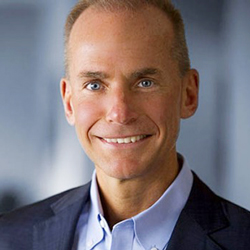Boeing CEO Talks Space Exploration ‘Revolution’ at Patterson Lecture
Dennis Muilenburg spoke on Wednesday, May 2 in Northwestern’s Lutkin Hall
Nearly 50 years ago, the Apollo 11 space flight landed the first humans on the moon, an event that crossed once-unimaginable scientific thresholds and intensified global interest in human space exploration.
According to Dennis Muilenburg, chairman, president, and CEO at Boeing, a “crescendo of activity” in the space exploration marketplace is now propelling a new era of pioneering action. In the coming decades, Muilenburg foresees a viable space tourism business taking root, humans walking on Mars, and smart manufacturing facilities in space.
 “I think we are on the cusp of a revolution, a transformation in human space exploration,” Muilenburg told a near-capacity crowd at Northwestern’s Lutkin Hall on May 2. “Programs underway today are bigger and more significant than the Apollo program.”
“I think we are on the cusp of a revolution, a transformation in human space exploration,” Muilenburg told a near-capacity crowd at Northwestern’s Lutkin Hall on May 2. “Programs underway today are bigger and more significant than the Apollo program.”
Muilenburg offered his remarks during the 37th Annual Patterson Transportation Lecture. Hosted by the Northwestern University Transportation Center, the Patterson Lecture brings recognized leaders from the transportation field to the Northwestern campus to discuss contemporary topics in a dynamic, fast-changing industry.
Boeing and space travel
Though best known for its work with commercial airlines, Boeing holds deep ties to space exploration. The 102-year-old aerospace company, the world’s largest with approximately 140,000 employees around the globe, has played a role in lunar footsteps, space shuttle launches, and the assembly of the International Space Station.
Yet, Muilenburg largely focused his talk on the future of human space exploration, which he called important to Boeing and aerospace, but also to the US and the world. He said space travel offers benefits to society, economies, and technologies, driving innovations in areas ranging from human physiology to manufacturing, but also inspires talent to enter STEM fields.
He identified four specific energizing developments at Boeing:
- CST-100 Starliner, the first private US vehicle to fly to low-Earth orbit
- X-37B, an autonomous vehicle that can operate up to 500 miles above the Earth’s surface
- Phantom Express, a vehicle that will break the cost curve on launching satellites into space
- Space Launch System, the first rocket to bring humans to Mars
In addition to Boeing’s efforts, Muilenburg noted swelling competition in the space travel field, including efforts from the likes of Elon Musk’s SpaceX and Richard Branson’s Virgin enterprise. Rather than seeing that competition as a threat, however, Muilenburg termed it “an asset” that pushes a collaborative industry to pursue audacious goals.
“This is truly a globally collaborative business and one that requires the talents of the world,” said Muilenburg, later adding that there is “no end to the innovation and ideas that are coming to the table.”
On Earth and beyond
Following his presentation, Muilenburg devoted time to answering an array of audience questions. The executive addressed topics such as environmentalism in air travel, artificial intelligence, the movement from space exploration to space utilization, and hypersonic flight, often citing specific Boeing initiatives at the forefront.
Muilenburg teased game-changing innovations such as flying urban taxis that are “not so far away” and relayed that Boeing invests $6 billion annually toward future innovation.
“We see innovation as our number one target of how we use cash at our company,” said Muilenburg, who joined Boeing in 1985.
As Muilenburg spoke on space exploration, he championed sustained advocacy and long-term funding for novel programs and assured that leaping over previously uncrossed scientific boundaries would unlock a world of innovation.
“It’s very clear to me there’s an economic and technology ripple benefit of deep space exploration and that only comes with taking on that challenge,” he said.